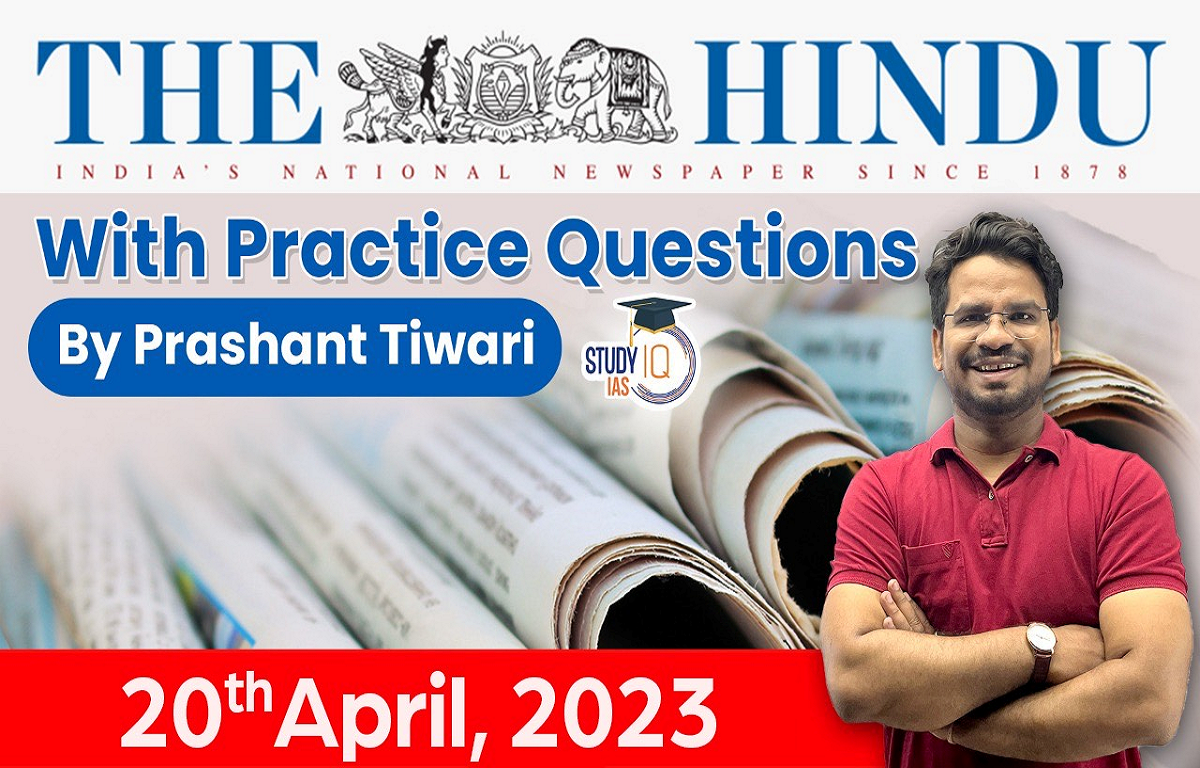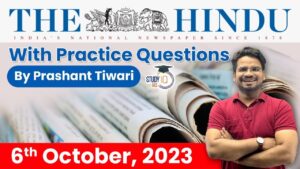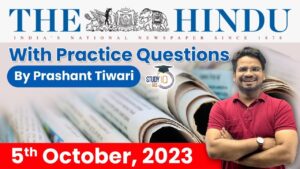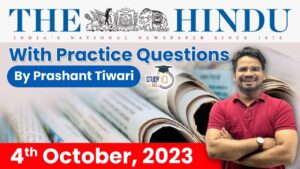The Hindu Newspaper Analysis for UPSC

The Hindu Newspaper Analysis 18 April 2023

- India is set to overtake China to become the world’s most populous country by the middle of 2023, according to data released by the United Nations.
- India’s population is pegged to reach 142.86 crore against China’s 142.57 crore. This shows India will have 29 lakh more people than its Asian neighbour.
- The United States is a distant third, with an estimated population of 34 crore, the data by the State of World Population Report, 2023 of the UN Population Fund (UNFPA) showed. The world’s population hit the 800-crore mark in November 2022.

- As stray dog attacks increase, the Centre has decided to reach out to the States, local self-governments (LSGs) and resident welfare associations (RWAs) on implementing the new set of Animal Birth Control Rules prepared by the Animal Husbandry Ministry recently.
- Notified on March 10, the rules put the onus of maintaining and controlling the population of stray dogs on LSGs and RWAs.
- The Central Government has notified the Animal Birth Control Rules, under Prevention of Cruelty to Animal Act, 1960 and after superseding the Animal Birth Control (Dog) Rules, 2001.
Key highlights of Rules
- Animal Birth Control programme for the sterilization and immunization of stray dogs are to be carried out by the respective local bodies/municipalities/Municipal Corporations and Panchayats.
- Animal Birth Control Programme needs to be carried out by AWBI (Animal Welfare Board of India) recognized organization.
- The Municipal Corporations need to implement the ABC and Anti Rabies Program jointly.
- Also, the Cruelty involved for carrying out the ABC programme needs to be addressed.
- The Rules also provide guidelines on how to deal with the human and stray dog conflicts without relocating the dogs in an area.

- After Tripura, Meghalaya has announced the closure of all educational institutions in parts of the State due to a heatwave. This is the first such instance for a State known more for its pleasant weather and ample rain.
- An official notification said the decision was taken keeping the health issues of the schoolchildren in mind. According to the notification, the State government has also requested the private school authorities to keep their educational institutions closed for the same period.
- “Tripura is currently experiencing high temperatures with the mercury reaching 40 degrees, which is 5-6 degrees above average for the current summer season,” officials said. The Meteorological Department said the maximum temperature is expected to be in the range of 35-39 degrees across Tripura for a few more days.

- On April 6, 2023, the Union government introduced a new set of measures with a view to crushing fake news and misinformation on the Internet. These introductions came through an amendment made to the Information Technology (Intermediary Guidelines and Digital Media Ethics Code) Rules, 2021, or IT Rules.
- The amendment grants to the Union Ministry of Electronics and Information Technology (MeitY) unbridled power to create a “fact check unit”, which will identify false or misleading online content that concerns the central government’s business in any manner.
- The upshot of the new regulation is this: the Union government gets to decide for itself what information is bogus and gets to exercise wide-ranging powers of censorship by compelling intermediaries to take down posts deemed fake or false. In a democracy, where information is free, and where the right to freedom of speech is constitutionally guaranteed, the new law must strike us as deeply abhorrent.
- And these commands militate against substantive constitutional guarantees. Article 19(1)(a) grants to every citizen a right to freedom of speech and expression.
- That right can only be limited through reasonable restrictions made by law on one or the other of the grounds stipulated in Article 19(2), namely, in “the interests of the sovereignty and integrity of India, the security of the State, friendly relations with foreign States, public order, decency or morality or in relation to contempt of court, defamation or incitement to an offence”.
- In its landmark judgment in Shreya Singhal vs Union of India (2015), the Supreme Court, in striking down Section 66A of the IT Act, held that a law that limits speech can neither be vague nor over-broad.


- The United Arab Emirates (UAE), whose food security has been built on imports from global markets, is now focusing on the twin objectives of food access and readiness to confront supply chain crises.
- India, the world’s second-largest food producer, is an essential partner in the UAE’s ambition to strengthen food security. The India-UAE food security partnership stands to benefit from multiple points of convergence.
- India brings to the table an incredible wealth of food sector experience and the ability to operationalise the world’s largest food supply chains — formidable capabilities that are strengthening the India-UAE food security partnership in a variety of ways.
- During the I2U2 (India, Israel, the United Arab Emirates and the United States) summit in July last year, the UAE committed $2 billion in investment towards constructing food parks in India (in Madhya Pradesh and Gujarat), while the signing of a food security corridor on the Comprehensive Economic Partnership Agreement (CEPA)’s sidelines (with logistics partner DP World) has taken forward India’s envisioned presence on the global food value chain, beyond the UAE.

- While the impetus in trade and the effort to balance imports and exports with an important partner (Russia) are welcome, it is hard to ignore the circumstances surrounding these developments. Since Russia’s war in Ukraine began last year, and western sanctions drastically cut Russian exports, Moscow has turned increasingly to India and other countries including China that have not joined the sanctions to export resources.
- India’s oil imports from Russia (a negligible 0.2%), have jumped since the war to a massive 28% of its total oil intake, contributing to trade as well as a growing deficit.
- While the Ukraine Foreign Minister’s accusation that India has “blood” on its hands by buying Russian oil is overstating the case, the impression that New Delhi is “benefitting from the war” is gaining traction in western countries, which must be noted, especially as Mr. Modi will soon visit Japan, Australia, the U.S. and France, and also welcome Mr. Putin for the SCO summit in Delhi in July.

- The social media influencer drawn into the Cadbury’s Bournvita controversy has a supporter. The Nutrition Advocacy in Public Interest — India (NAPi), a think tank working on nutrition policy, has issued a statement saying it stands by him.
- However, this has brought to the boil the real issue at hand — the Food Standards and Safety Authority of India (FSSAI) dragging its feet over implementing its own guidelines to regulate packaged and processed food.
- The FSSAI has been discussing the possibility of front-of-pack labelling. According to this, brands would need to put a notification indicating if a food product was high in fat, sugar, and salt (HFSS). The labelling would allow consumers to make informed choices.
- Food Safety and Standards Authority of India (FSSAI) is an autonomous statutory body established under the Food Safety and Standards Act, 2006 (FSS Act).
- Ministry of Health & Family Welfare, Government of India is the administrative Ministry of FSSAI.
- Headquarters: Delhi.



 The Hindu Newspaper Analysis 6 October 2...
The Hindu Newspaper Analysis 6 October 2...
 The Hindu Newspaper Analysis 5 October 2...
The Hindu Newspaper Analysis 5 October 2...
 The Hindu Newspaper Analysis 4 October 2...
The Hindu Newspaper Analysis 4 October 2...





















